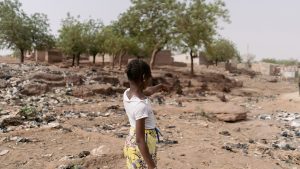
Lorna Rothery spoke to the Executive Director of the Lancet Countdown, Marina Romanello, about the urgent need to address climate risks to safeguard a healthy future.
Since 2016, the Lancet Countdown has brought together researchers from across the globe to document and track the effects of climate change on health. Following the release of last year’s report, which made clear the urgency with which solutions to mitigate the impact of climate risks are needed, Lorna Rothery spoke to the Executive Director Marina Romanello about the report’s key findings and her thoughts on the outcomes from COP 27.
What were the key actions you were hoping to see from last year’s Climate Change Conference (COP 27) within the context of a health-centred climate response and how do you feel about the overall outcomes?
It was a bittersweet outcome. There were significant achievements including the loss and damage funds agreement which was fundamental for vulnerable countries that are heavily impacted by climate change. There has also been good progress in defining a global goal on adaptation that will incorporate health, which is also fundamental to protect vulnerable communities from the rising health impacts of climate change. It was reassuring to see vulnerable countries achieving that long overdue acknowledgement from the more industrialised nations concerning the damage they have generated, and the need to take action to protect people and address those impacts.
At the same time, more could have been done on the mitigation front. There was not an increased sense of ambition following the previous COP, the need to urgently phase out all fossil fuel burning still goes unmentioned – with unabated coal being the only form of fossil fuel named in the agreement. Furthermore, the language around the need to peak emissions was removed from the final draft and that generates huge concerns from a health perspective. Unless we act promptly to reduce our carbon emissions and mitigate climate change then loss and damage, and the health impacts of climate change, will inevitably go towards a worst-case scenario. As much as we emphasise the importance of adaptation and compensation, unless we address environmentally damaging practices it will not be possible to avoid increased suffering in the future.
There has been a sense of political inertia when it comes to actively addressing the health impacts of climate change. Why have political leaders been slow to act and is the narrative changing?
I think the narrative is slowly changing; we are seeing much more acknowledgement from a health perspective and indeed in conversations around climate change. We have seen health mainstreamed in the global goal of adaption, and the right to health and a healthy environment enshrined at the very opening of the agreements during COP 27. There is greater awareness of the human dimensions of climate change and the extent to which our lives, and our survival, are hanging in the balance. What we are still yet to see, particularly within climate negotiations, is a strong commitment towards delivering on that increased awareness. Unfortunately, all of our indicators from the Lancet Countdown tell us that the health impacts of climate change are rapidly increasing alongside a rise in emissions which reached a new record high this year. Adaptation and mitigation action is lagging way behind the levels of ambition that would enable a thriving future.
What is perhaps the most concerning is countries do not realise the enormous opportunities they have had in terms of delivering much healthier environments and lifestyles. For instance, improving air quality, promoting sustainable diets and adapting cities to enable healthier lifestyles.
The current energy crisis holds huge opportunities for us to become more resilient to future crises. Countries are trying to gain independence from Russian oil and gas, particularly Europe, but that over-dependence on Russian oil and gas came from the slow adoption of clean, renewable energies. We could have avoided much of the crisis that we are currently facing. Strengthening our zero-carbon energy generation offers an enormous opportunity in terms of reducing energy poverty, which in essence, is a health crisis and has enormous implications for health here in Europe, and elsewhere. This is quite a crucial moment to ensure that countries do not backslide into an over-dependence on fossil fuel markets that are very frail and politically vulnerable, but rather commit now to taking action in delivering a healthy future.
Looking at the data from the recent Lancet Countdown report, what were the key insights that stood out for you in terms of the consequences of the climate crisis on health?
All of our indicators which we monitor are rapidly getting worse, and that is perhaps the biggest concern. It is not one in isolation, but it is the fact that across every area the health risks of climate change are getting worse. What that tells us is that we are not dealing with individual hazards, but a whole environment that is starting to jeopardise our health and our wellbeing and we are going to be fighting these on many different fronts.
The report shows that the health impacts of climate change are starting to interact with the health impacts of other crises that are occurring simultaneously. For example, the cost-of-living crisis and the energy crisis, and the energy poverty that generates. The slow adoption of clean, renewable energies means people are struggling to afford the clean and healthy energy needed in their homes.
Because of our slow adoption and slow transition to cleaner energies, amid an energy crisis, we are now turning more to dirty fuels, and we are seeing the health impacts of that air pollution rising as a result. We are also seeing the food crisis exacerbated by the war in Ukraine and the supply chain disruptions that have been generated. That is also, as we have seen in our data, interacting with climate change; heatwaves in 2021 were associated with almost 100 million more people reporting an inability to access the food that they need. Again, what comes from our impact indicators is that we are not operating against one hazard but a systemic threat to our health and the systems that we rely on, compounded by current crises.

Unless we act promptly to reduce our carbon emissions and mitigate climate change then loss and damage, and the health impacts of climate change, will inevitably go towards a worst-case scenario
Are healthcare infrastructures suitably equipped to withstand the effects of climate change? What solutions are needed to make health systems more efficient and sustainable?
Some healthcare services are better equipped than others, but in general terms, I would say the clear answer is no. When we look particularly at low-and-middle-income countries, their health systems are frail, but even in high-income countries, the COVID-19 pandemic exposed the limits of our health systems and the extent of their fragility. Countries are not acting fast enough to develop climate change adaptation plans and risk assessments, nor are they implementing the capacities that were mandated under the International Health Regulations in terms of being able to cope with health emergencies.
Whenever we have extreme weather events such as the recent floods in Europe or hurricanes in Small Island Developing States, we see the extent to which health services are at the frontline of climate change. We need to equip them to respond to the rapidly rising health impacts of climate change, and strengthen their infrastructure so they are not so vulnerable. During hurricane seasons, we have seen the damage to healthcare facilities, and also healthcare workers at the frontline who are suffering. In a moment of crisis, when health systems are needed the most, they are at their weakest.
Why is it so important to consider the One Health approach when discussing climate change and health?
When we talk about the impact of climate change on health, we are talking about the impact on all of the environments that we interact with. For example, we know that through our consumption of meat and dairy, and other animal products, our food systems are generating enormous carbon footprints – around 30% of all global greenhouse gas emissions. But then we also know that shifting away from red meat and consuming a more plant-based diet is healthier, and in the context of the One Health approach, many zoonotic diseases come from the way we produce our food and rear livestock. By transitioning to healthier diets, we not only support our health but reduce the risk of zoonotic diseases and mitigate climate damage. The human and natural systems are inextricably linked.
What can be done to raise awareness about the effects of climate change on health?
One crucially important thing is how we are understanding and communicating climate change and health. For many years, we have isolated ourselves from the climate conversation and framed this as a problem for polar bears and not a problem that affects us and our loved ones today. That is why it is so crucially important that when we face an extreme weather event, we rapidly link those climate impacts to health. We must understand that what we are facing is not a threat to the inanimate world or the environment in isolation, but rather a threat to our health and the environment that our very survival depends on.
Dr Marina Romanello
Executive Director
Lancet Countdown
https://www.lancetcountdown.org/
https://www.facebook.com/lancetcountdown
https://twitter.com/LancetCountdown
This article is from issue 24 of Health Europa Quarterly. Click here to get your free subscription today.








